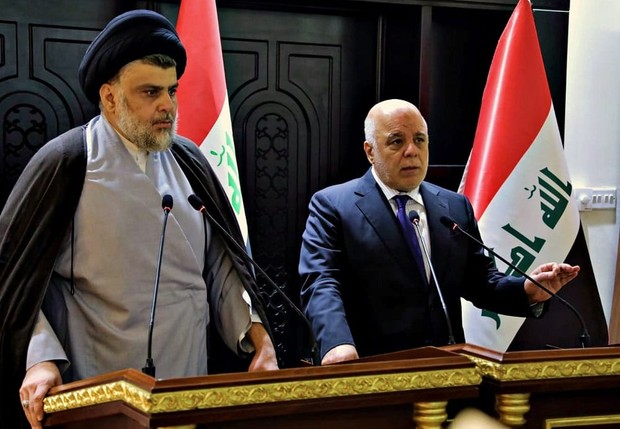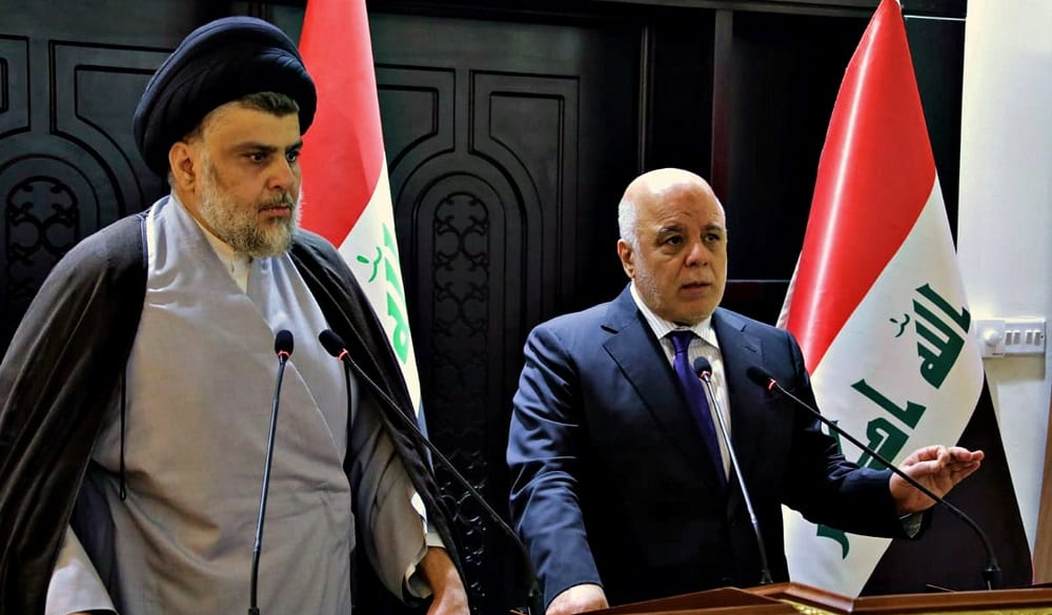
In this photo provided by the Iraqi government, Iraqi Prime Minister Haider al-Abadi, right, and Shiite cleric Muqtada al-Sadr hold a press conference in the heavily fortified Green Zone in Baghdad, Iraq, early Sunday, May 20, 2018. Shiite cleric Muqtada al-Sadr, whose coalition won the largest number of seats in Iraq’s parliamentary elections, says the next government will be “inclusive.” The May 12 vote did not produce a single bloc with a majority, raising the prospect of weeks or even months of negotiations to agree on a government. (Iraqi Government via AP)
Throughout the Iraq War, there were two major struggles being fought separately and simultaneously. One of those was the fight against al Qaeda and the remnant of the Baathist power structure. This battle was largely won by the 2006 Surge. The second fight was against Iran and its proxies, the Sadr Army. When Obama decided to throw away a hard-won victory in 2009 (couldn’t afford to say that Chimpy McBushitler was capable of doing anything right, could we?), Iraq descended into a status as a virtual Iranian client state. Iranian militias operated against ISIS inside Iraq. Iraqi militias served under Iranian command.
So Iran was more than a little blindsided when Iraq’s new prime minister announced it will observe US sanctions on Iran.
Iraqi Prime Minister Haider al-Abadi’s comments that his country would abide by US sanctions has taken Iranian media by surprise.
“As a matter of principle we are against sanctions in the region,” Abadi said at a press conference Aug. 8. “Blockade and sanctions destroy societies and weaken regimes.” He added that they are a “strategic mistake” but that Iraq “will abide by them.”
For last 18 months Team Obama & echo chamber got journalists and pundits to write that Trump couldn't successfully reimpose sanctions on Iran & if he tried US would "isolated."
Sunday reminder those were nonsense pro-deal talking pts masquerading as news https://t.co/RlTcX9QVjh
— Omri Ceren (@omriceren) August 12, 2018
There are several moving parts here. Most Iraqis don’t want to be an Iranian puppet state. We saw that during the Iraq election when Sadr, himself, was stoking anti-Iran sentiment. The Shia connection is overblown in the Western media and the chasm of language and culture and Arab-Persian animosity is wide. Opposing sanctions in principle but honoring them is not only good politics but good economics. Iran needs access to the West more than it needs Iranian meddling.There is probably a gamble being made in Baghdad that Iraq can have its cake and eat it too, that is, that it can continue illicit trade with Iran while seeming to comply with sanctions. It wouldn’t be unexpected and it wouldn’t even be bad. This kind of smuggling would minimize the impact on Iraqi citizens but have zero impact on Iran’s ability to gain foreign capital.
The biggest point here, and one that is accentuated by numerous European companies ignoring the threat of EU sanctions if they comply with US sanctions is that the US is seen as serious in its intent. That is something we haven’t been about Iran since 1979. Even Reagan entertained the hope that Iran could be wooed to moderation and again be a US ally in the region, that was how we got the Iran-Contra Affair. I don’t think Trump’s cabinet has any illusions about Iran. SecDef Mattis is an Iran hawk of long-standing as is Mike Pompeo.
Regardless of the efficacy of Iraq’s act, the psychological impact will be significant. It will be a sign to the mullahs and the Iranian dissidents that Iran has become isolated and that situation will only grow more desperate over the coming year.














Join the conversation as a VIP Member